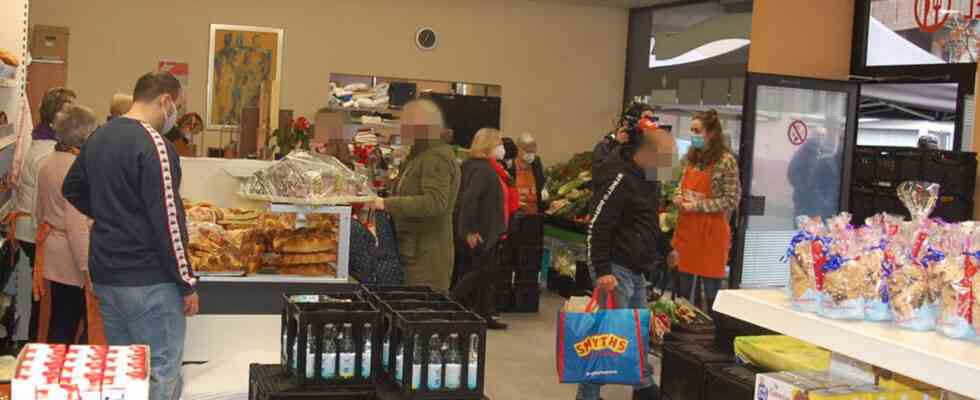Status: 07.10.2022 15:29
More and more people are dependent on food donations: but food banks, food-sharing initiatives and leftover shops are increasingly vying for the leftovers. This is also due to legal hurdles.
“It all started in January and February,” recalls Sabine Altmeyer-Baumann, state chairwoman of the Rhineland-Palatinate/Saarland food banks. “Since food prices have increased noticeably, more and more people have come to the food banks.” Then there are the Ukrainian war refugees. “At the same time, donations from retailers are declining.”
The result is that the panels could give the needy less food than before. Newcomers would initially be placed on a waiting list. Across Germany, more than two million people are now dependent on the panels. “Many food banks already have a freeze on admission,” says Anna Verres from the Federal Association of Food Banks. “Many more people will be at risk of imminent poverty in the coming months, but donations are already scarce.”
awareness increases
The awareness of donating food instead of disposing of it has increased significantly among manufacturers and retailers over the past two decades. According to the Federal Association of the German Food Trade, BVLH, retailers donate at least 74,000 tons of food to non-profit organizations every year. What sounds like a lot is, however, not much more than the amount of food that ends up in the garbage in Germany in two days.
In addition, less and less unsold food is left on supermarket shelves. Kristina Schütz, spokeswoman for the Rewe Group, says that modern forecasting systems and automatic ordering processes now enable markets to be supplied with fresh goods in line with their needs. “Meanwhile, Penny and Rewe sell more than 98 percent of their groceries on average every year.”
demonstrate need
Selling more means throwing away less, but also giving away less. Rewe has been working with the Tafel since 1996, Penny since 2007. Food is passed on that “can be eaten without hesitation,” they say. In addition, there is cooperation in selected cities with the association Foodsharing eV or comparable local associations and institutions. “Working with the food banks is a priority for us nationwide,” says Kristina Schütz. You appreciate that with the panels.
Because it is a fact that social enterprises or food-sharing initiatives, which like to call themselves “food rescuers” and so-called rescue shops, which often sell expired food cheaply, leave less for some food banks, confirms food bank spokeswoman Anna Verres. “We are the only ones who consistently pay attention to the social aspect.” Because anyone who comes to the Tafel has to prove their need, for example with proof of income.
One reason: legal uncertainty
One reason why some retailers are more likely to give groceries to food-sharing initiatives is legal uncertainty, says Sabine Altmeyer-Baumann from the Rhineland-Palatinate/Saarland Food Association. Because the panels would be treated as grocers before the law. “Food sharers, on the other hand, are considered private individuals,” says Verres from the Federal Association of Food Banks. Should there be problems, for example, by eating spoiled yoghurt, the food bank would be held liable. However, Verres says she has never heard of such a case.
So although the Tafel would be liable if someone upset their stomach, some retailers are reluctant to give the Tafel goods with an expired best-before date. Even if the goods can usually be consumed after the date after an inspection, emphasizes Verres.
But it doesn’t have to be the upset stomach that causes problems. According to the BVLH trade association, there is also a risk of legal difficulties if the amount of donated food differs from the information on the packaging due to a production error or if the list of ingredients is complete but not in the correct order. Tafels are then obliged to change the labels. However, they often do not have the personnel to do this.
Legislators have recognized the problem
According to the BVLH, if these legal hurdles were removed, the amount of donated food would continue to grow. The legislature has also recognized the problem. A federal and state committee is to review legislation with regard to hurdles and barriers, for example when passing on food. After all, the “National Strategy for Reducing Food Waste” plans to reduce the destruction of food by half by 2030. Even if the implementation is a long time coming, the Tafel-Bundesverband certifies that Minister of Agriculture Cem Özdemir takes the matter seriously.
Despite all the competition for food donations, food banks, food-sharing initiatives and other stakeholders finally agree on the goal that less food should end up in the garbage. Until the responsible ministry follows up on the intention with deeds, it will first celebrate the “Germany saves food” campaign week, including the awarding of the federal prize “Too good for the bin”. Meanwhile, the queues of the needy in front of the panels are getting longer and longer.

